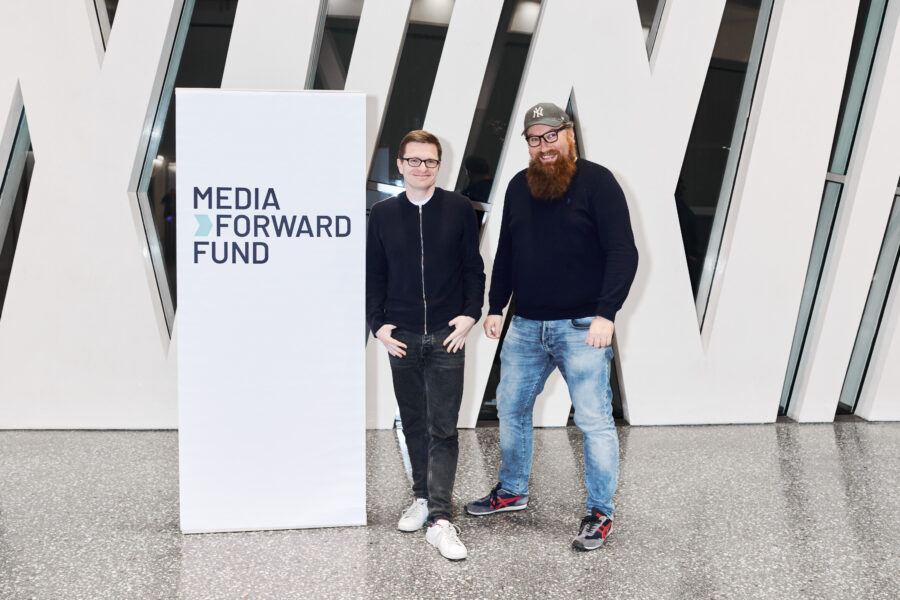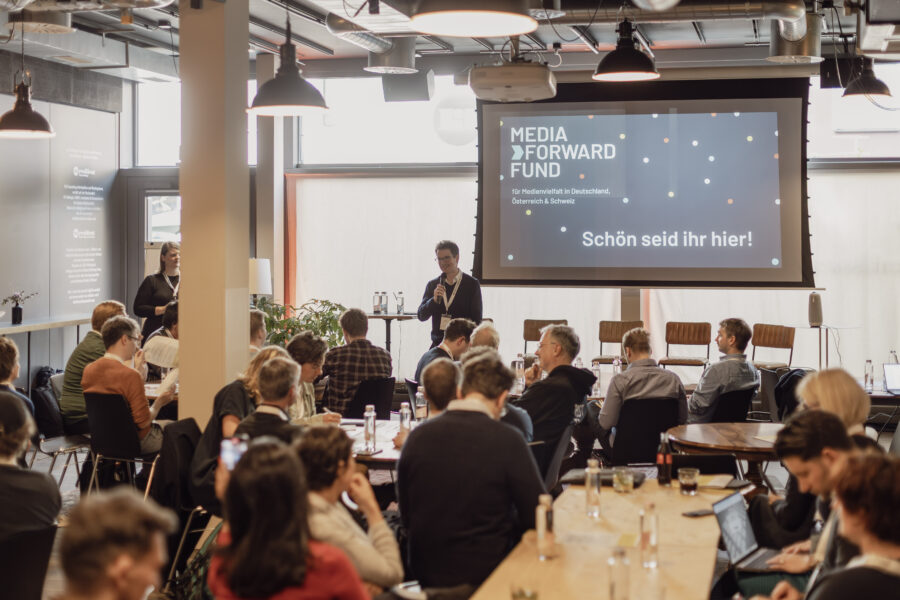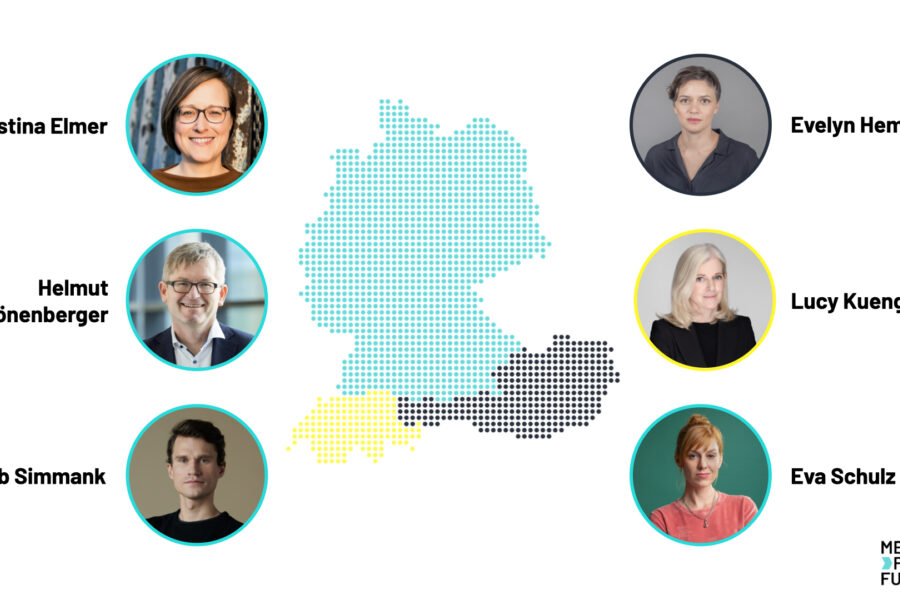Media Forward Fund jury sends a clear signal for local journalism
Six media organizations receive funding totaling 1.5 million euros, including four newsrooms from Germany and two from Switzerland - transformative business models to finance local journalism as well as science and data journalism awarded - Patrick Swanson joins the jury - next call starts on August 11, 2025
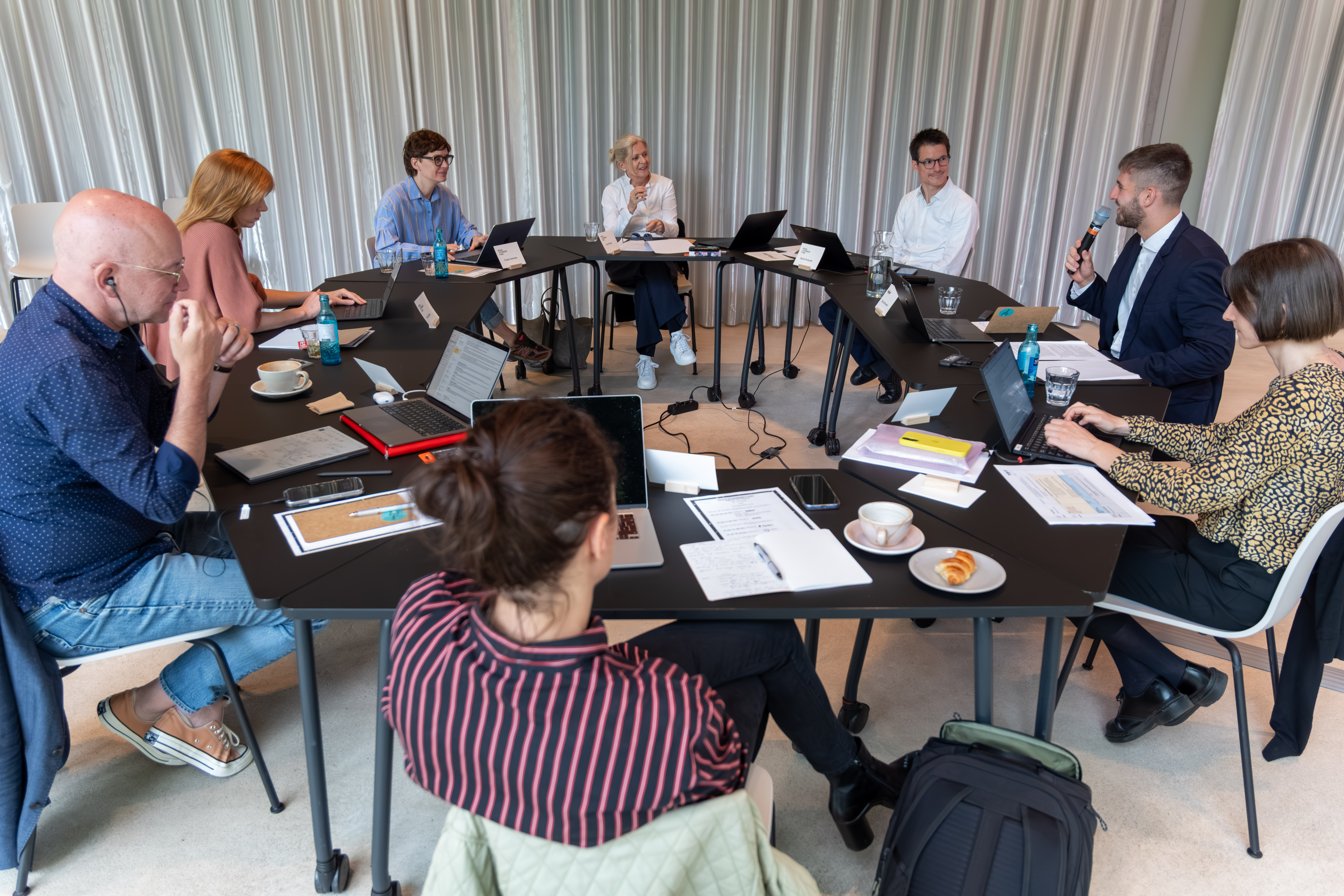
Berlin / Vienna / Zurich - July 15, 2025: Media Forward Fund (MFF), founded a year ago to strengthen public value journalism and democracy in Germany, Austria and Switzerland, today presents the new grantees from the second funding call. Six media outlets will receive funding totaling 1.5 million euros: In the General Funding Line (GEN), the independent jury awards three media outlets funding of up to 400,000 euros each, including one from Germany and two from Switzerland. In the new Science and Data Journalism (SCI) funding line, three further media outlets from Germany will receive launch grants of up to 100,000 euros each.
This time, the jury selected three local media out of 113 applications from the entire DACH region that work with three different business models to finance community-oriented local journalism: from deeply rooted community journalism close to a local urban target group to hyperlocal, AI-supported information offerings in rural areas to the strategic development of municipalities in suburban areas as new financing partners.
“With its decision, the jury is sending a clear signal that there are many promising, transformative business models in local journalism,” says Martin Kotynek, Founding Director of Media Forward Fund. "With this funding, we can contribute to the growth of these models of public value journalism so that local media can finance themselves more independently. In this way, they can serve as a blueprint for local media throughout the DACH region."
The grantees of the General Funding Line (GEN)
The non-profit Swiss local media outlet Bajour, which reaches over 20,000 people every day and has established itself as an important journalistic service in Basel with its Basel Briefing newsletter since 2019, is receiving a grant of 400,000 euros. Bajour intends to use the funding to expand its Basel Briefing with hyperlocalized news to the ten most populous suburban communities in Basel. In addition, municipalities with a duty to inform are to be brought on board as financial cooperation partners, while new paying supporters and additional advertising revenue are to be generated.
The jury recognizes the approach of “deep local journalism”: "Bajour offers an easily accessible service in terms of tone and language that is tailored to the communicative needs of the local target group. The approach of tapping into communities as a source of revenue in their distribution channels has the potential to serve as a role model for local journalistic innovation for the entire DACH region."
The MFF is entering into a cooperation with the German local medium loky* from the Berlin district of Prenzlauer Berg, which aims to build a local news community through everyday newsletter journalism and regular dialogue, with project funding of 400,000 euros. The aim is to expand the reporting area and offerings to neighboring districts and thus gain additional newsletter subscriptions.
loky* convinced the jury as a pioneer for urban community journalism with high relevance directly on site: "loky* understands the special needs and topics of the local target group and has built a strong and convincing brand concept on this. We particularly liked the lightness, curiosity and optimism as a response to the phenomenon of news avoidance."
New digital village newspapers: Spatz is a Swiss digital platform that is building a network of AI-supported hyperlocal news sources via newsletter and WhatsApp - by and for the village community. Media Forward Fund is providing 400,000 euros to support the scaling strategy of the non-profit media organization Spatz and an expansion from eight to at least twenty digital village newspapers in the DACH region. In addition, a sustainable financing mix of memberships and the development of local advertising markets is to be established.
“With its AI-generated journalistic offerings, Spatz fills the gaps in rural areas that traditional journalism has left behind,” says the jury in its statement. “We see an interesting and innovative business model with high scaling potential to serve rural and sparsely populated regions in Switzerland and beyond.”
The grantees of the Science and Data Journalism Funding Line (SCI)
In contrast to the General Funding Line, where funding is awarded for the growth of public-interest business models that have already been tested on the market, the Science and Data Journalism Funding Line offered “Launch Grants”, which are intended to support a project from idea to launch. This funding line is offered in cooperation with the Wissenschaftspressekonferenz e.V. (WPK).
The MFF is entering into a partnership with the public-interest science editorial team of TWENTYTWO Film from Cologne, which already produces widely viewed, accessible science journalism for young audiences under the Doktor Whatson brand on YouTube. The project is supported with funding of 100,000 euros. As part of the project, a new Instagram format is to be launched for the successful brand, which uses creative data visualizations to provide information on relevant topics for young people.
The jury praises the clear focus on its target group and the experimental drive of the project: "TWENTYTWO Film shows that well-founded science journalism can also work on attention-driven platforms such as YouTube. Particularly noteworthy: the production should become more independent of individual hosts."
The investigative research and transparency platform FragDenStaat, which requests official information at state and EU level based on information rights and evaluates it in a proto-journalistic manner for cooperation with major media partners such as ZDF Magazin Royale, will receive 75,000 euros in funding. With a Federal Press Conference Tracker, FragDenStaat aims to implement a data journalism tool that documents, tags and categorizes statements from federal ministries, factual questions and answers from members of the Federal Press Conference in order to show over long periods of time which topics are frequently discussed, and which are largely ignored.
The jury emphasizes the proto-journalistic infrastructure work that encourages other media to shed light on a topic that would otherwise remain hidden: "The FragDenStaat project strengthens the function of the Federal Press Conference as a subject of reporting. As a data journalism innovation tool, it makes discourse transparent and comprehensible in the long term. It also has the potential to have a positive impact on other data-driven business models."
The German platform Dekoder, which serves as a bridge between journalism and academia by curating, translating and contextualizing relevant content from independent, non-governmental Russian-, Belarusian- and Ukrainian-language journalism, will receive funding of 75,000 euros. With a new newsletter service, Dekoder plans to publish two weekly newsletters: one in German, which will provide information on current events in Russia, Ukraine and Belarus, and another for a Russian-speaking audience, which will provide academically sound classifications on Germany.
"Curation is becoming increasingly important in times of information overload and fragmented public spheres. By curating and translating relevant articles, Dekoder offers a reliable source of information in a media segment characterized by propaganda," said the jury, explaining its decision. “Dekoder has already made a positive impression on us with its data journalism projects and we support its transformation into an independent journalistic format.”
Clear commitment to local journalism and transformation
Local journalism provides an essential foundation for information and democratic participation but faces major financial challenges due to the decline in the print model. In its first two funding rounds, Media Forward Fund has now supported four different local journalism models - Bajour, loky*, Spatz and Tsüri – that have the potential to serve as solutions beyond their regions.
“The public sector should also promote such transformative approaches to independently financing local journalism in order to ensure a reliable supply of information at the state, canton and municipality levels,” says Martin Kotynek, Founding Director of Media Forward Fund. Funding should be organized independently of the state, i.e. in a way that prevents donors from deciding who receives the funding to ensure the independence of the funded media.
The MFF Founding Director sees a particular need for improvement in the Austrian funding system, as none of the 20 applications from Austria made it to the final this time: "State funding in Austria is leading media down the wrong path. Instead of rewarding transformative approaches, the print model continues to be strongly supported. This model doesn’t stand up to comparison within the DACH region.”
Change in jury composition
As in the first call, the jury for the GEN funding line consisted of Yves Daccord, Maria Exner, Lucy Kueng, Eva Schulz and Evelyn Hemmer. The members of the jury for the SCI funding line were Christina Elmer, Helmut Schönenberger and Jakob Simmank. Eva Schulz, Evelyn Hemmer and Lucy Kueng joined the SCI jury to ensure a uniform assessment of the award criteria across all funding lines.
Evelyn Hemmer will no longer serve on the juries of Media Forward Fund, as she is taking on a new role as Media Policy Advisor in the Austrian Vice-Chancellor’s office. Her seat on the juries will be taken over, starting with the next call, by Austrian journalist Patrick Swanson. He recently completed the John S. Knight Journalism Fellowship at Stanford University and founded Verso, an AI transformation consultancy in San Francisco. Swanson helps media companies, non-profits and companies in Europe and the US in developing innovative digital strategies and sustainable business models. His journalism background includes work with ORF, where he set up the country's widest-reaching social media channels for Zeit im Bild.
Next MFF call starts in August
The next funding round starts on August 11, 2025. Applications can be submitted until August 22. The application phase will once again be accompanied by online info sessions in German, English, and French – as well as an in-person session on August 7 in Leipzig, with a special focus on Eastern Germany.
About Media Forward Fund
The first transnational fund for the promotion of journalism in Germany, Austria and Switzerland is committed to more high-quality independent media with viable business models, which publish strong, trustworthy content and are sustainably financed. The aim is to strengthen diversity in public-interest journalism, and thus democracy.
Media Forward Fund was established on the initiative of the Schöpflin Foundation, Mercator Foundation Switzerland, Volkart Foundation, Rudolf Augstein Foundation, ZEIT STIFTUNG BUCERIUS, Allianz Foundation, Stiftung für Medienvielfalt, ERSTE Foundation, DATUM FOUNDATION for Journalism and Democracy, MacArthur Foundation (USA), the impact investor Karma Capital Group and Publix - House for Journalism & Public Sphere. As part of the new Science and Data Journalism funding line, five additional German foundations joined the MFF in January 2025. In March, the German Postcode Lottery also came on board. The development of the fund was supported by a project grant from the Federal Government Commissioner for Culture and the Media. To date, Media Forward Fund is endowed with 10 million euros.
Press contact for journalists
Agency LOEBELL NORDBERG
Annabel Köle-Loebell, Managing Partner
Tel.: +43-676-6904023
E-Mail: al@loebellnordberg.com
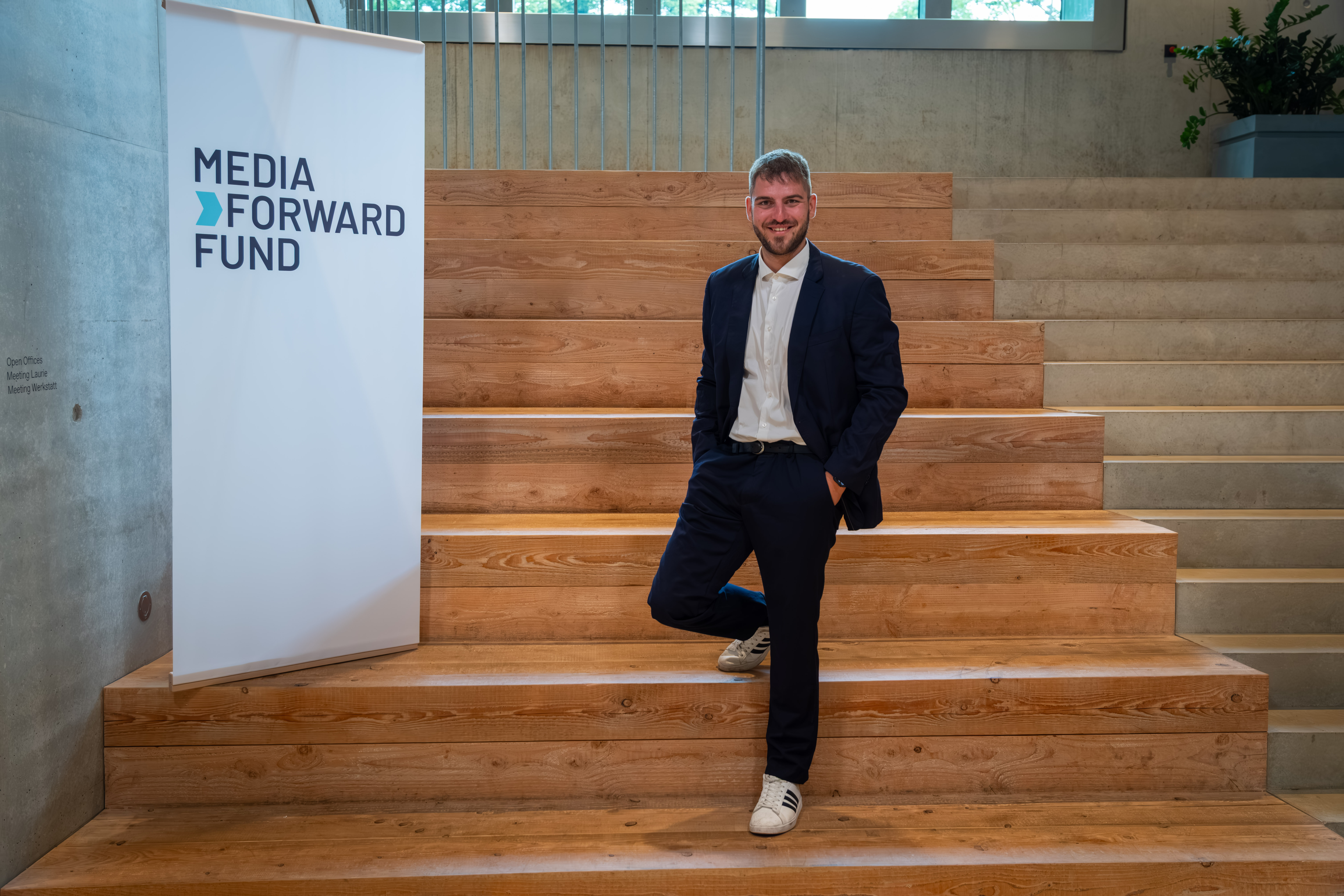
Niccolo Brunetti from the Swiss medium Bajour (Copyright: Paul Alexander Probst)
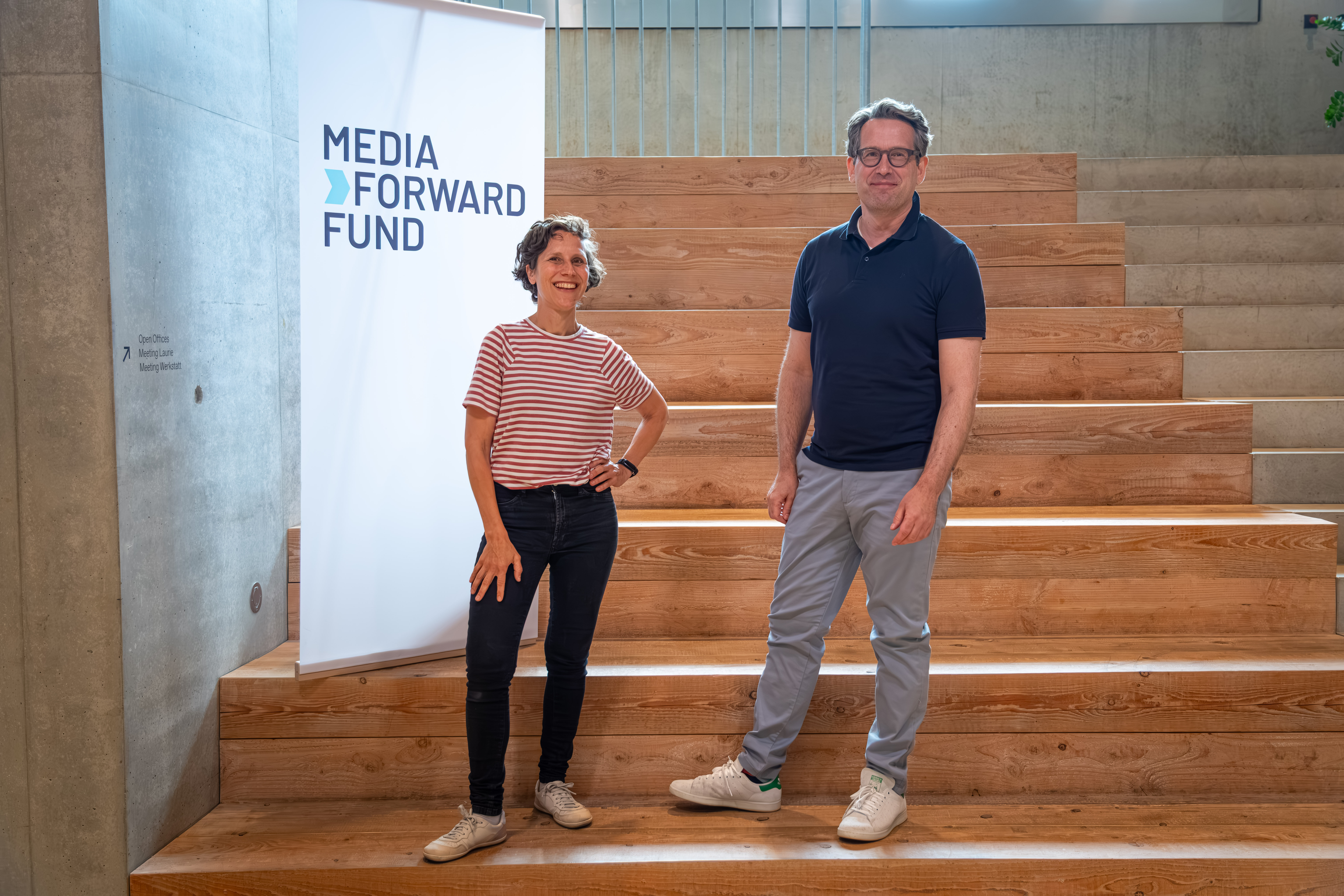
Juliane Schader and Philipp Schwörbel from the German medium loky* (Copyright: Paul Alexander Probst)
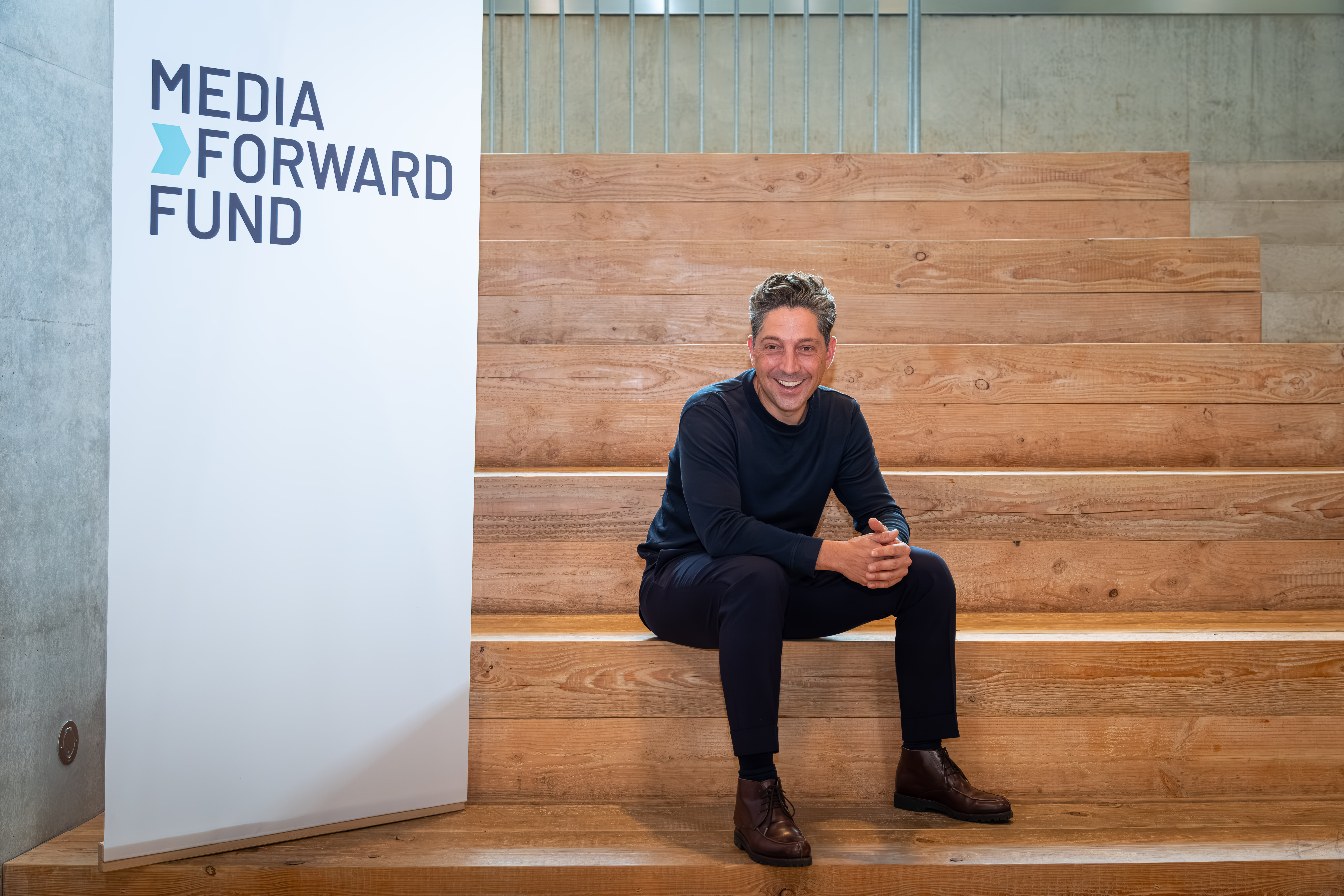
Hannes Grassegger from the Swiss medium Spatz (Copyright: Paul Alexander Probst)
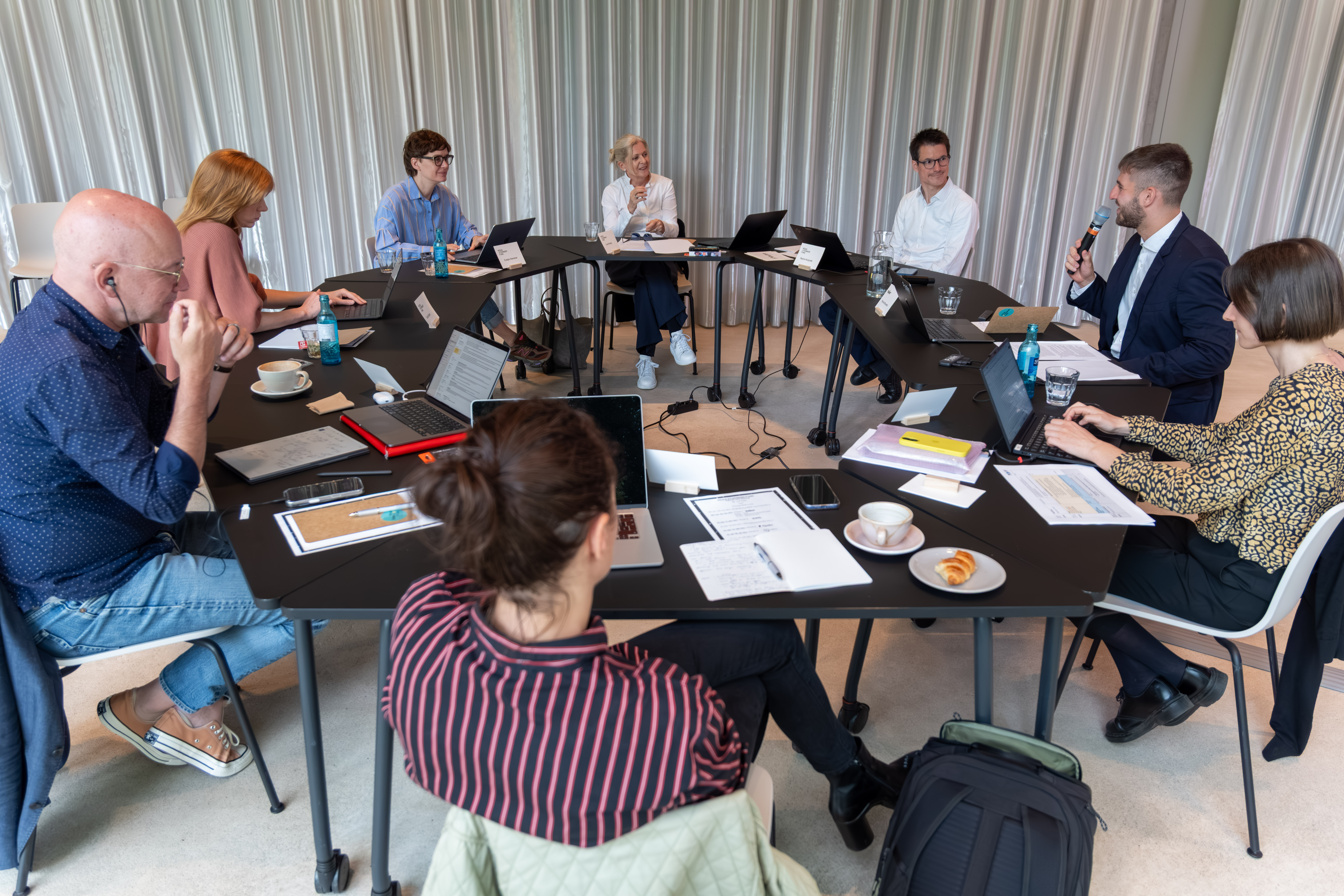
The jury of Media Forward Fund discusses the submitted applications at the jury meeting on July 8th
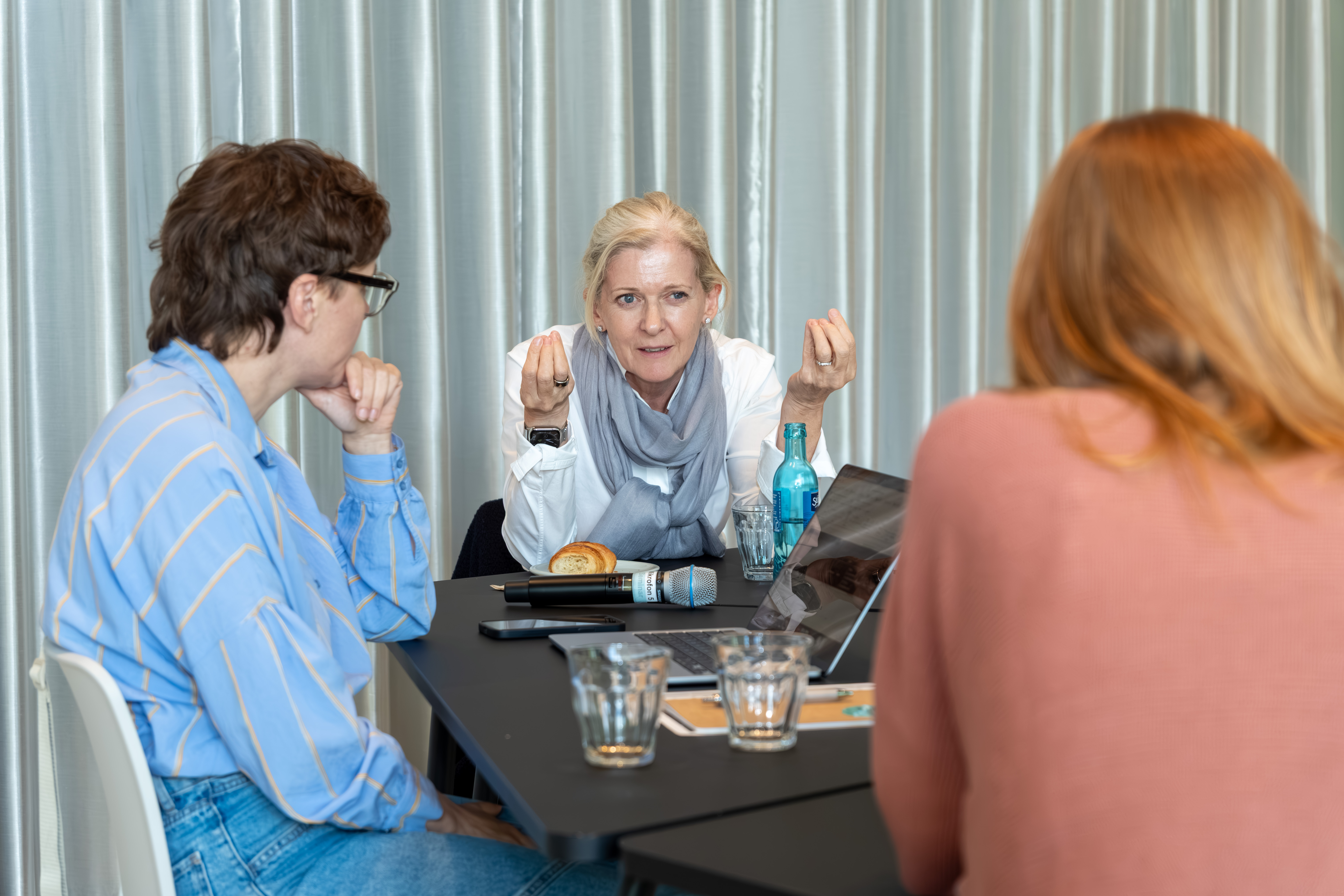
Lucy Kueng (center) in conversation with Evelyn Hemmer (left) and Eva Schulz (right) (Copyright: Paul Alexander Probst)
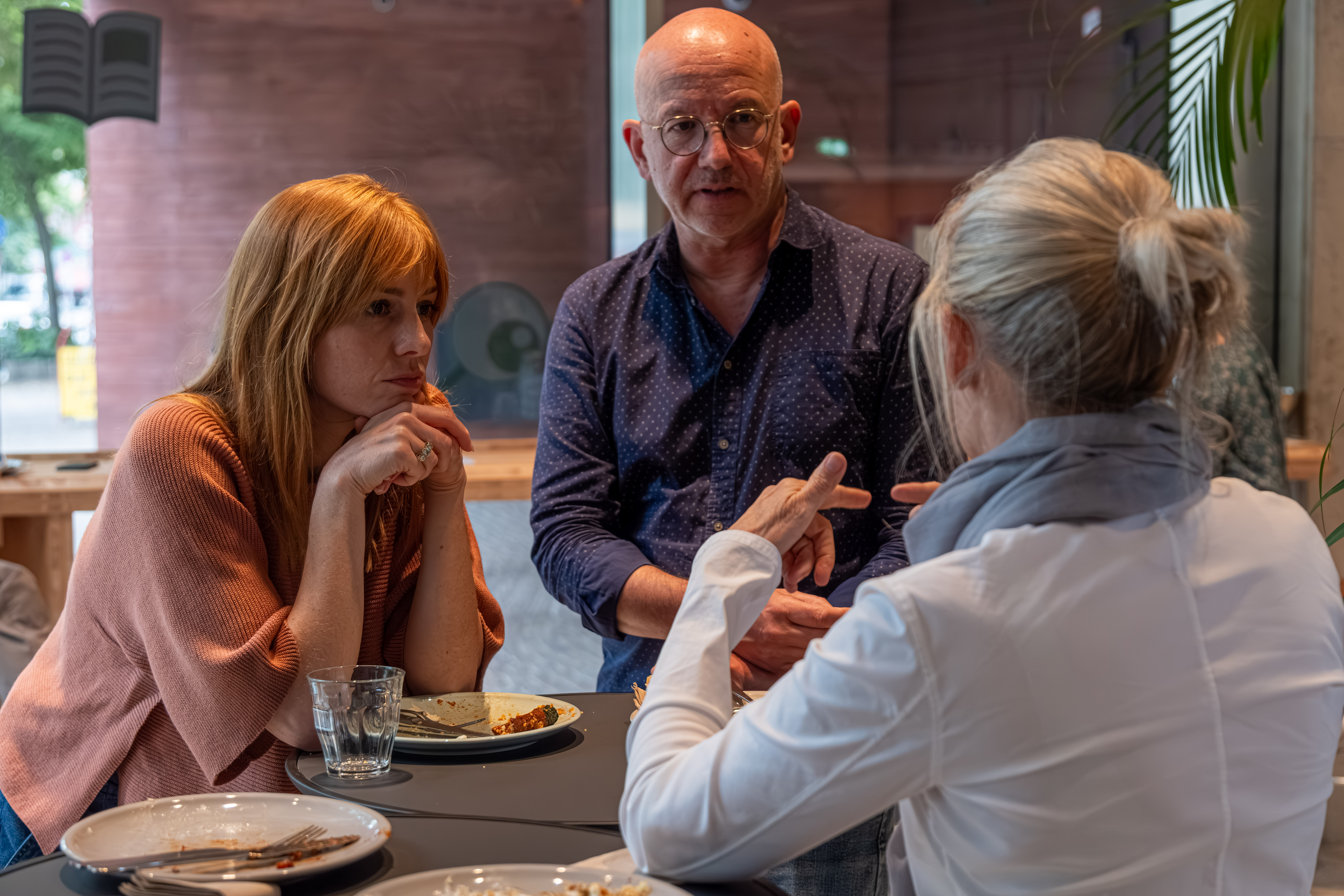
Eva Schulz (left) in conversation with Yves Daccord (center) and Lucy Kueng (right) (Copyright: Paul Alexander Probst)
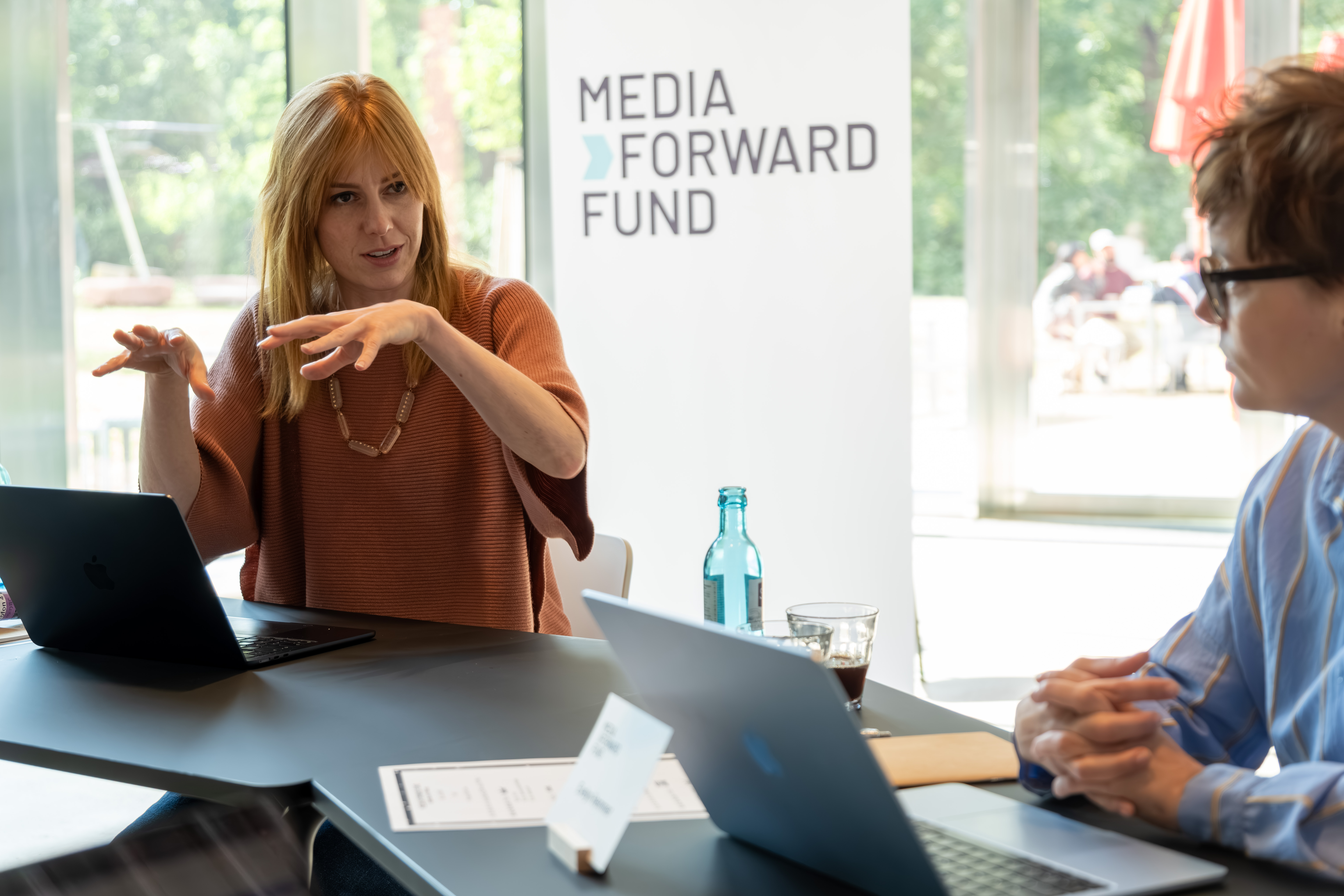
Eva Schulz (left) in conversation with Evelyn Hemmer (right) (Copyright: Paul Alexander Probst)
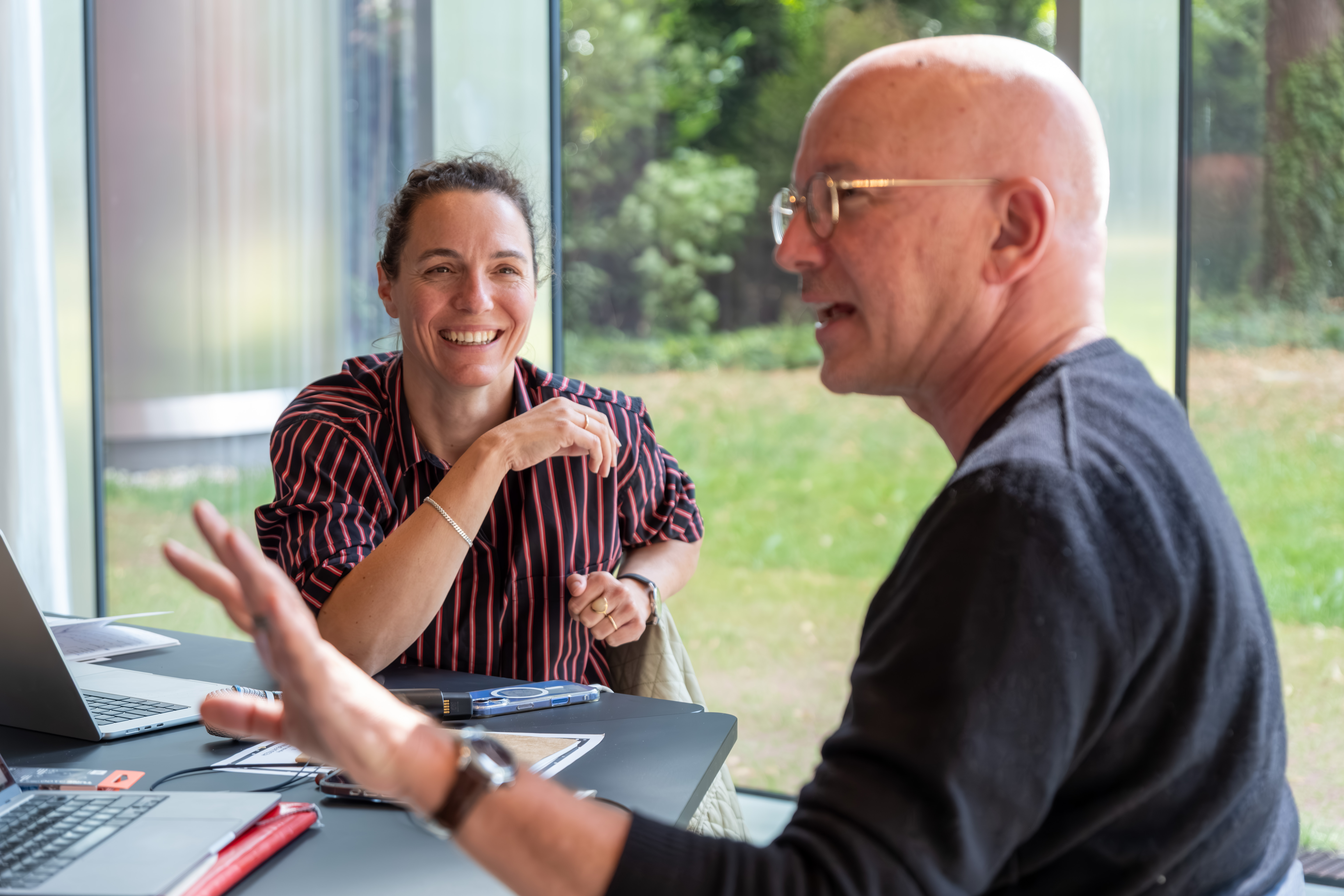
Maria Exner and Yves Daccord (Copyright: Paul Alexander Probst)
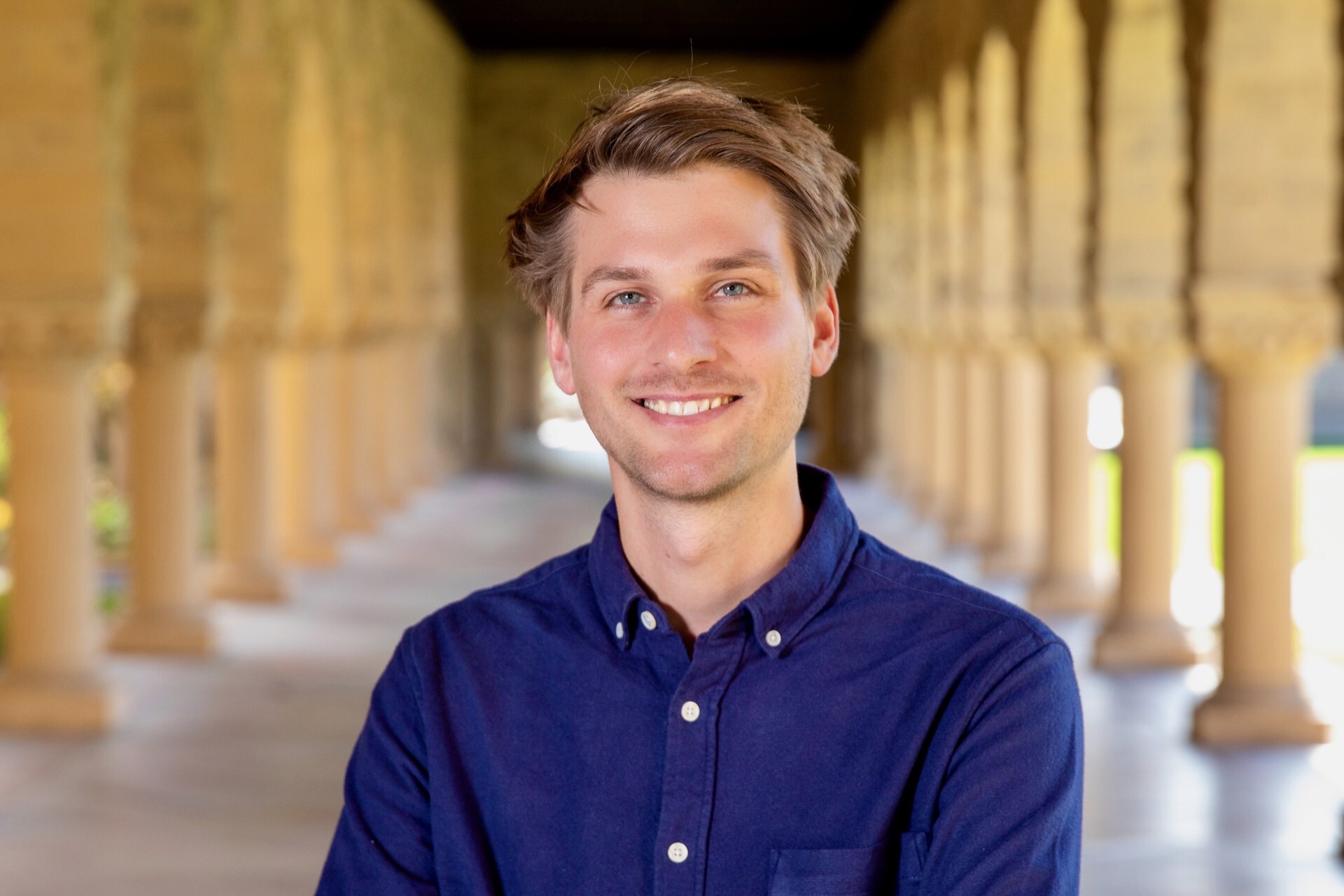
Patrick Swanson (Copyright: JSK Fellowships, Stanford)
